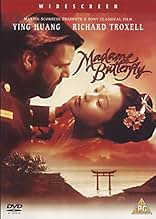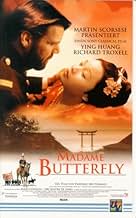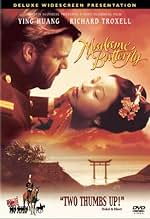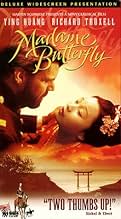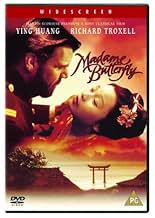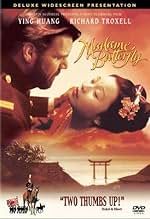The story of a young geisha who falls madly in love with an american captain that travels all around the world collecting hearts.The story of a young geisha who falls madly in love with an american captain that travels all around the world collecting hearts.The story of a young geisha who falls madly in love with an american captain that travels all around the world collecting hearts.
- Director
- Writers
- Stars
- Awards
- 1 win & 1 nomination total
- Director
- Writers
- All cast & crew
- Production, box office & more at IMDbPro
Featured reviews
I love Madame Butterfly so naturally I wanted to see this 1995 film. And I am so glad I saw it, as it is a beautiful and excellent film of a wonderful opera. At hindsight, the opera's story is rather implausible, however the love story and telling of it is timeless, Cio Cio San is a charming lead character and the music(my favourites being Humming Chorus, Flower Duet, Un Bel Di Vedremo and particularly the act 1 love duet) is among Puccini's very finest.
There are only two things I wasn't crazy about here. One was showing the Gonze as a supernatural figure and floating in mid air, I personally found it unnecessary and felt it distracted from the drama of that particular moment. The other was the use of black and white footage of old Japan. In a way it was interesting, but I for one wasn't entirely sure whether it fitted with the scene(Humming Chorus in this case).
However, this film is visually stunning, with sweeping camera shots, stunning scenery and evocative costumes. The beautiful music is beautifully performed by the orchestra and is conducted with precision and sensitivity. When it comes to the acting/staging, the love duet was genuinely affecting and the Flower Duet blended and acted beguilingly, but the revelations were Un Bel Di Vedremo and the final scene, both of which moved me to tears.
The acting and singing work hugely too. Ying Huang amazed me with her beauty and appealing voice, and Richard Troxell is an excellent Pinkerton, never trying too hard to make us hate him. Ning Liang is one of the most sympathetic Suzukis I know of, and Sharpless shapes his music beautifully. Goro also is more cynical and less bumbling, something that I loved and found refreshing.
Overall, excellent film and one where a box of tissues by your side is necessary. 8/10 Bethany Cox
There are only two things I wasn't crazy about here. One was showing the Gonze as a supernatural figure and floating in mid air, I personally found it unnecessary and felt it distracted from the drama of that particular moment. The other was the use of black and white footage of old Japan. In a way it was interesting, but I for one wasn't entirely sure whether it fitted with the scene(Humming Chorus in this case).
However, this film is visually stunning, with sweeping camera shots, stunning scenery and evocative costumes. The beautiful music is beautifully performed by the orchestra and is conducted with precision and sensitivity. When it comes to the acting/staging, the love duet was genuinely affecting and the Flower Duet blended and acted beguilingly, but the revelations were Un Bel Di Vedremo and the final scene, both of which moved me to tears.
The acting and singing work hugely too. Ying Huang amazed me with her beauty and appealing voice, and Richard Troxell is an excellent Pinkerton, never trying too hard to make us hate him. Ning Liang is one of the most sympathetic Suzukis I know of, and Sharpless shapes his music beautifully. Goro also is more cynical and less bumbling, something that I loved and found refreshing.
Overall, excellent film and one where a box of tissues by your side is necessary. 8/10 Bethany Cox
Mitterand's production of Madame Butterfly is an outstanding piece of movie-making. Handled so delicately, the film will have appeal to both opera lovers & movie buffs alike.An enchanting love story, beautiful singing, music by Puccini, an interesting set ( a "house of cards" atop a mountain with views of sea and sky) make for a handsome film. I like the opening sequence which quickly establishes the atmosphere of old Japan. We are introduced to the main character- Butterfly, a 15 year old Japanese girl whose family has fallen into poverty & B.F. Pinkerton, a naval officer, her self-assured American lover who treats her as a sexual plaything. Sacrificing all her ties with the Japanese way of life Butterfly agrees to marry Pinkerton. During the marriage celebrations her absent Uncle Bonzo appears magically suspended in the sky & he casts her into eternal damnation for renouncing her people and ancient rites. This is the only weak point in the movie. It's such a serious moment and yet I wanted to laugh. It's obvious that the three figures in the sky are suspended by wires (a bit jerky too). Why accept this when current cinemaphotography has reached such heights in producing supernatural effects? The characterisations are generally well-done. The part of Butterfly particularly appealing performed with such grace and sincerity. Pinkerton too makes a convincing thoughtless man of the world. In an early scene however he kneels on the floor and converses with Butterfly's maid. I thought this was quite wrong and out of character unless he was trying to ridicule the Japanese customs.When eventually Butterfly becomes pregnant, a son is born, but by now Pinkerton is back in America. For three years she awaits his return. There are some very moving scenes at this point. Finally Pinkerton returns to Nagasaki with an American wife ("a real wife" he calls her). There is a poignant scene when the devoted Butterfly relinquishes her son to Pinkerton's wife. He will go back to the States and be educated there. What future is there for Butterfly? (Tissues may be required at this point!)The ending is heart-rending. I am not a particular lover of opera but after this exciting experience I am ready for more.
Madame Butterfly is a beautiful, romantic and dramatic story. It is all about a fifteen years old geisha called Cio Cio-San, who gets married with the official of the American navy, Benjamim Franklin Pinkerton.
Pinkerton, the fiancé, is just buying a woman, as he did in other parts of the world, to be close in his moments of loneliness, while he doesn't marry a true American wife.
After three years of marriage, Pinkerton goes back to the United States, leaving Butterfly with a small son he never knew. Cio Cio San believes that her husband will return, and she refuses to assume her Japanese values and a new life.
During all the story, Cio Cio-San will always count with the unconditional friendship of the maid Suzuki.
To get things worst, Butterfly receives a letter of Pinkerton informing that he will not return anymore, making clear that he married an American woman. Butterfly interprets his words in an erroneous way, and she sees new hopes for of her husband arrival.
He returns, however, to look for his son.
The end of the plot shows the suicide of Butterfly, when noticing that she had lost everything that she loved, the husband and now also the son. (She had used as a weapon her father's sword, with the inscription: "To die with honor, when one can no longer live with honor". The now-humiliated, heartbroken daughter of a disgraced samurai, she dies proudly - as a samurai.)
The opera is tragic, because Cio Cio-San really believes in her illusions, and she only notices the mistakes very late.
There are difficulties, for example, how she was renounced by her relatives by converting Pinkerton's religion (Catholicism), or her son, that came to this world, only after the American had already left.
The history is full of cultural contrasts, since the story is in the Japan of the beginning of XX century, where the prejudices were worst.
The reason whyI liked this movie so much : in my opinion, it is the best Madame Butterfly I have ever seen in a movie. I was surprised to see that the movie is all sang in opera terms. Many people might not like that.
The sets are beautiful, and the movie was made full of details, to really show the Japanese habits, thoughts and life style.
Frédéric Mitterrand had even the concern of choosing Asian actors to play in the cast, much better then Jean Pierre-Ponnele's version, where all of the actors are westerns.
Pinkerton, the fiancé, is just buying a woman, as he did in other parts of the world, to be close in his moments of loneliness, while he doesn't marry a true American wife.
After three years of marriage, Pinkerton goes back to the United States, leaving Butterfly with a small son he never knew. Cio Cio San believes that her husband will return, and she refuses to assume her Japanese values and a new life.
During all the story, Cio Cio-San will always count with the unconditional friendship of the maid Suzuki.
To get things worst, Butterfly receives a letter of Pinkerton informing that he will not return anymore, making clear that he married an American woman. Butterfly interprets his words in an erroneous way, and she sees new hopes for of her husband arrival.
He returns, however, to look for his son.
The end of the plot shows the suicide of Butterfly, when noticing that she had lost everything that she loved, the husband and now also the son. (She had used as a weapon her father's sword, with the inscription: "To die with honor, when one can no longer live with honor". The now-humiliated, heartbroken daughter of a disgraced samurai, she dies proudly - as a samurai.)
The opera is tragic, because Cio Cio-San really believes in her illusions, and she only notices the mistakes very late.
There are difficulties, for example, how she was renounced by her relatives by converting Pinkerton's religion (Catholicism), or her son, that came to this world, only after the American had already left.
The history is full of cultural contrasts, since the story is in the Japan of the beginning of XX century, where the prejudices were worst.
The reason whyI liked this movie so much : in my opinion, it is the best Madame Butterfly I have ever seen in a movie. I was surprised to see that the movie is all sang in opera terms. Many people might not like that.
The sets are beautiful, and the movie was made full of details, to really show the Japanese habits, thoughts and life style.
Frédéric Mitterrand had even the concern of choosing Asian actors to play in the cast, much better then Jean Pierre-Ponnele's version, where all of the actors are westerns.
In early August I saw this opera for the first time as a 2017 performance at the Royal Opera House, and I loved the music so much I decided to watch this version as well. What makes this movie stand out is the decision to cast Asian actors and actresses for the Asian roles.
Ying Huang (Cio-cio-san/Butterfly) played the affection-starved yet goodhearted woman beautifully. Richard Troxell (Pinkerton, the American naval officer) played the entitled "playboy" so convincingly I had the urge to slap him through the screen. Jingma Fan (Goro) played the marriage broker; in this version he's not only oppertunistic but also slightly malicious which was surprising but Fan played it well.
The visuals in this movie were unexpectedly beautiful. Instead of depicting the bustling harbour city of Nagasaki they chose a more rural setting with thatched houses; as it was shot "on location" in Tunisia the village is dotted with olive trees rather than pine trees. This was probably done for economic reasons, yet it doesn't feel fake for a moment: the houses look real and lively, the gardens are lined with flowers, people are fishing for mussels in the surf. The costumes and interiors were pretty as well. The cinematography was a bit clunky at times (especially in Act 3) which admittedly bothered me more than it should have.
However, I feel the director took too many artistic liberties. By inserting flashbacks and flash-forwards and making it appear as if days or even months pass between different musical pieces he interrupted the pacing of the music. He also left out a good 10 minutes of music at the beginning of Act 3 ("Oh Eh ! Oh Eh !")
Despite some flaws on the director's part, this still makes for a good movie with good casting, beautiful casting and beautiful visuals. I can recommend this movie to everyone, even the people who don't like opera.
Ying Huang (Cio-cio-san/Butterfly) played the affection-starved yet goodhearted woman beautifully. Richard Troxell (Pinkerton, the American naval officer) played the entitled "playboy" so convincingly I had the urge to slap him through the screen. Jingma Fan (Goro) played the marriage broker; in this version he's not only oppertunistic but also slightly malicious which was surprising but Fan played it well.
The visuals in this movie were unexpectedly beautiful. Instead of depicting the bustling harbour city of Nagasaki they chose a more rural setting with thatched houses; as it was shot "on location" in Tunisia the village is dotted with olive trees rather than pine trees. This was probably done for economic reasons, yet it doesn't feel fake for a moment: the houses look real and lively, the gardens are lined with flowers, people are fishing for mussels in the surf. The costumes and interiors were pretty as well. The cinematography was a bit clunky at times (especially in Act 3) which admittedly bothered me more than it should have.
However, I feel the director took too many artistic liberties. By inserting flashbacks and flash-forwards and making it appear as if days or even months pass between different musical pieces he interrupted the pacing of the music. He also left out a good 10 minutes of music at the beginning of Act 3 ("Oh Eh ! Oh Eh !")
Despite some flaws on the director's part, this still makes for a good movie with good casting, beautiful casting and beautiful visuals. I can recommend this movie to everyone, even the people who don't like opera.
The first time I saw Madama Butterfly was early August 2020, as a 2017 performance at the Royal Opera House. I loved the music so much I decided to watch this version as well. This movie has taken a realist approach to depicting the story by Asian singers for the Asian roles. This choice was slightly at the cost of operatic quality, but if for the sake for top-notch voices the cast had been whitewashed and replaced by singers twice as old, I would have skipped it. This is a movie, not a live performance.
Ying Huang (Cio-cio-san/Butterfly) played the affection-starved yet goodhearted woman beautifully, if not a little stiffly at times. Richard Troxell (Pinkerton, the American naval officer) played the entitled "playboy" so convincingly I had the urge to slap him through the screen. Jingma Fan (Goro) played the marriage broker; in this version he's not only oppertunistic but also slightly malicious which was surprising but Fan played it well.
The visuals in this movie were unexpectedly beautiful. Instead of depicting the bustling harbour city of Nagasaki they chose a more rural setting with thatched houses; as it was shot in Tunisia the village is dotted with olive trees rather than pine trees. This was probably done for economic reasons, yet it never feels fake: the houses look real and lively, the gardens are lined with flowers, people are fishing for mussels in the surf. The costumes and interiors were pretty as well.
However, I think the director took too many artistic liberties. By inserting flashbacks and flash-forwards and making it appear as if days or even weeks pass between different events he interrupted the pacing of the music. He also left out about 10 minutes of music at the beginning of Act 3 ("Oh Eh ! Oh Eh !") The cinematography was pretty during shots of landscapes and outside scenes, but during interior scenes the mostly static shots tended to make the rooms look cramped.
Despite good singers and beautiful set design, its shortcomings on both the cinematic and operatic side make this film fall short of being great. However, it is still good and I can recommend this to everyone.
Ying Huang (Cio-cio-san/Butterfly) played the affection-starved yet goodhearted woman beautifully, if not a little stiffly at times. Richard Troxell (Pinkerton, the American naval officer) played the entitled "playboy" so convincingly I had the urge to slap him through the screen. Jingma Fan (Goro) played the marriage broker; in this version he's not only oppertunistic but also slightly malicious which was surprising but Fan played it well.
The visuals in this movie were unexpectedly beautiful. Instead of depicting the bustling harbour city of Nagasaki they chose a more rural setting with thatched houses; as it was shot in Tunisia the village is dotted with olive trees rather than pine trees. This was probably done for economic reasons, yet it never feels fake: the houses look real and lively, the gardens are lined with flowers, people are fishing for mussels in the surf. The costumes and interiors were pretty as well.
However, I think the director took too many artistic liberties. By inserting flashbacks and flash-forwards and making it appear as if days or even weeks pass between different events he interrupted the pacing of the music. He also left out about 10 minutes of music at the beginning of Act 3 ("Oh Eh ! Oh Eh !") The cinematography was pretty during shots of landscapes and outside scenes, but during interior scenes the mostly static shots tended to make the rooms look cramped.
Despite good singers and beautiful set design, its shortcomings on both the cinematic and operatic side make this film fall short of being great. However, it is still good and I can recommend this to everyone.
Did you know
- TriviaThe entire Japanese village set and house were built in Tunisia, Northern Africa.
- GoofsDuring Act 2 and Act 3, a blooming wisteria is shown to be growing along the house's roof above the porch. In reality wisteria would not have been grown here as the house's structure would have been unsuitable for it. Wisteria is a plant known to become heavy and massive with age; it would have been grown along a sturdy trellis or stone wall instead as not to cause any damage.
- Quotes
Lieutenant Benjamin Franklin Pinkerton: She's like a porcelain doll. She sets me on fire.
- How long is Madame Butterfly?Powered by Alexa
Details
- Release date
- Countries of origin
- Language
- Also known as
- Madame Butterfly, de Frederick Mitterand
- Filming locations
- Production companies
- See more company credits at IMDbPro
Box office
- Gross US & Canada
- $65,196
- Opening weekend US & Canada
- $6,027
- May 5, 1996
- Gross worldwide
- $65,196
Contribute to this page
Suggest an edit or add missing content

